Sporting Life: The story of the football matches on the Western Front during the truce of Christmas 1914
The folk tale of the First World War's 'Christmas truce' football match is so familiar that it has become accepted among the factual events of the war, but what actually happened when British and German soldiers went over the top on 25th December, 1914?
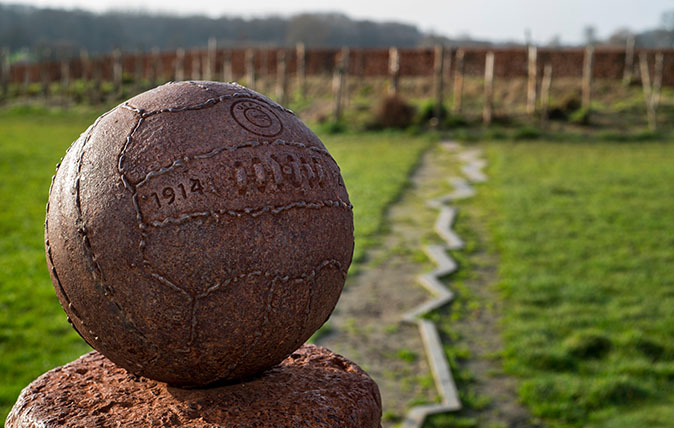

As a cold December blew onto the Western Front in 1914, it became apparent that the war would not, as the British public had originally thought, be ‘over by Christmas’.
The last of Britain’s professional soldiers were beginning to settle into life in the trenches, adopting the ‘live and let live’ attitude that came with extended periods of trench warfare during World War I. High Command on both sides of the war were growing wary of such behaviour, worried that it would impact their long-term goals if troops became reluctant to fight their opposition.
The rank and file weren't the only ones looking for an end to the violence, though. Pope Benedict XV referred to the war as ‘the suicide of civilised Europe’ and spent the first four years of his papacy campaigning to bring an end to it, efforts which included proposing a ‘Truce of God’ on the 7th of December. He asked the warring powers ‘that the guns may fall silent at least upon the night the angels sang’. His pleas fell on deaf ears – at least among the military hierarchy.
The situation at the front line was somewhat different, however. Various truces began to spring up along the Front from as early as mid-December, made necessary by the fallout from the heavy fighting which occurred in the first five months of war. Unofficial arrangements were made in individual areas to collect and bury bodies, with some sections refusing to fight at all – but this was by no means ubiquitous and some parts of the Front continued to fight as fiercely as ever.
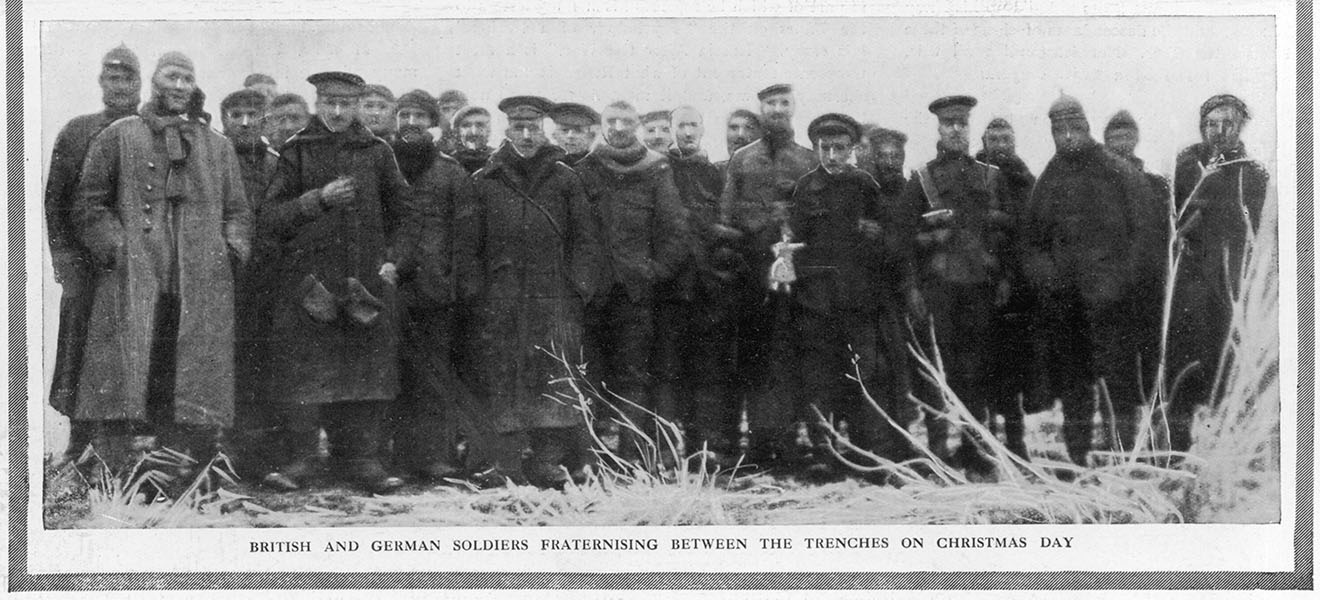
In the BBC's 1981 documentary 'Peace in No Man's Land', Graham Williams of the London Rifle Brigade recalls that on the night before Christmas (the time when German seasonal celebrations come to a head), sounds of German festivities permeated No Man’s Land and spread towards the British trenches.
'All of a sudden lights appeared along the German trench and I thought “there’s a funny thing”,' said Williams.
'And then the Germans started singing “stille nacht, heilige nacht”’. We applauded them then we thought we must retaliate in some way, so we replied with “The First Noel”.
Sign up for the Country Life Newsletter
Exquisite houses, the beauty of Nature, and how to get the most from your life, straight to your inbox.
'When we finished that they all began clapping, then they struck up their other favourite carol of theirs, “O Tannenbaum”.
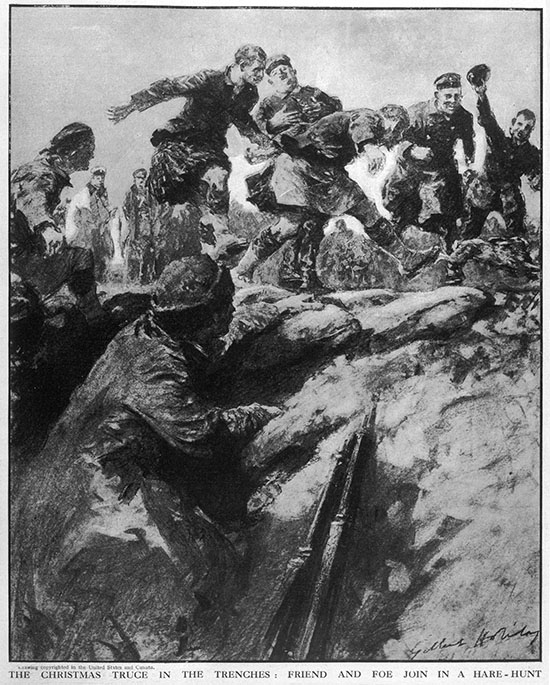
‘Then we started up "O Come All Ye Faithful" and the Germans immediately joined in singing the same thing to the Latin words of "Adest Fideles". Well I thought this was rather an extraordinary thing really – to think of the two nations both singing the same carol in the middle of a war.’
This sweet story may already be familiar to some – famously recalled in Blackadder Goes Forth by Hugh Laurie’s character, George.
As the fictional George reminisces, on Christmas Day several soldiers did indeed cross over their trenches to share well wishes with their foreign counterparts. Gifts were exchanged; men swapped liquors, cigarettes and chocolates.
Hundreds of men came out to greet each other; by the estimate of the Imperial War Museum's Malcolm Brown in his recent book on the Christmas Truce, a truce was observed along at least two-thirds of the British line. And then as now, put enough men together in one place – any place – and one of them will have a football. Those who didn't improvised: bundles of straw, boxes of provisions and anything else that came to hand were used as balls in different spots.
Kickabouts occurred up and down the front. Perhaps the best accounts come from the diary of Captain Robert Hamilton of the Royal Warwickshire Regiment, whose diary is the basis of the book Meet at Dawn, Unarmed, co-authored by his grandson. Unsure of the reception they would receive, the first soldiers over the top on each side acted warily; little by little they realised that each meant the other no harm, and before long cordial
German accounts have confirmed the stories too. In 2003 German historian Michael Jurgs published a book called The Small Peace in the Big War collating diary fragments relating to the truce and the football matches. Jurgs recounts how many of the Bavarian and Saxon soldiers had worked in England before the war, and spoke the language well. The conversations shouted across the trenches led to the ceasefire, and the ceasefire led to the meetings in No Man's Land - some of which became so cordial that English and German troops did everything from help bury each other's dead to giving each other haircuts.
Lieutenant Johannes Niemann of the 133rd Saxon Infantry Regiment described one of the football matches in a history he wrote of his regiment: ‘Suddenly a Tommy came with a football, kicking already and making fun, and then began a football match,' he wrote.
'We marked the goals with our caps. Teams were quickly established for a match on the frozen mud, and the Fritzes beat the Tommies 3-2.’
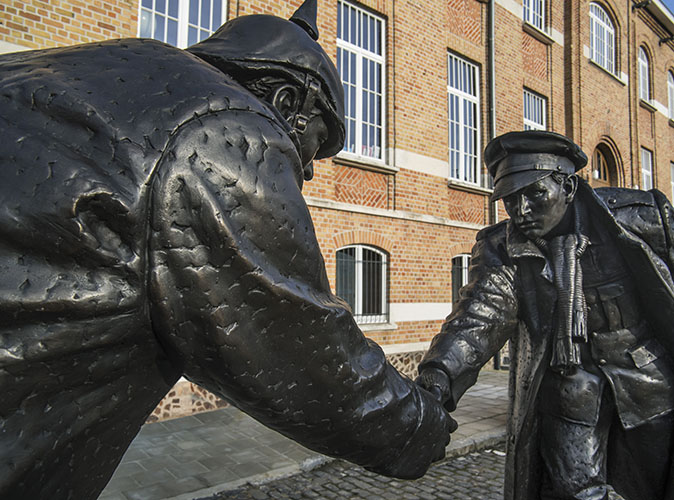
An anonymous letter printed in The Times on the 1st January 1915 listed described another football match further along the Front, this time with the 107th Saxon Infantry Regiment, which resulted in the same score.
British cartoonist Captain Bruce Bairnsfather, a friend of Hamilton and serving in the same regiment, wrote about the truce in his book Bullets and Billets, describing how German soldiers had put up signs along their trench reading ‘Merry Christmas’. A ceasefire followed shortly after, and men on both sides left their trenches to run around and keep warm.
Interestingly, the troops faced by Bairnsfather and Hamilton were Saxons, who were seemingly much more open to ceasefire than their Prussian comrades. By one account a soldier in a Saxon regiment called across to the British opposite them, 'We are Saxons, you are Anglo-Saxons. What do we have to fight about?'
A shame the men pulling the strings in the war didn't feel the same way. Then again, not all the soldiers involved felt the same either. A young Adolf Hitler was apparently appalled by what happened, while others seemingly felt that it bordered on the absurd.
'The English are extraordinarily grateful for the ceasefire, so they can play football again,' Gustav Riebensahm, of the 2nd Westphalian regiment, wrote in his diary as quoted by Jurgs. 'But the whole thing has become slowly ridiculous and must be stopped. I will tell the men that from this evening it's all over.'
Roughly 100,000 British and German troops were involved in the cessations, other regiments along the Front continued to fight and gunshots met those attempting to go over the top.
'In the following years almost none occurred at all. The use of poisonous gas and extensive losses on both sides made the soldiers bitter towards each other'
The Christmas Truce was by no means the first truce of the war but it would end up being one of the last. By the next year casualties on both sides meant only a few ceasefires were arranged over the Christmas season, and in the following years almost none occurred at all. The use of poisonous gas and extensive losses on both sides made the soldiers bitter towards each other and most were no longer amenable to cooperation.
Although the war would continue for almost four years after that first Christmas and the authorities tried their hardest to quell the image of the two warring factions uniting even for a day, the knowledge that both sides had put aside their differences for a day to get on – even having joint funerals for their dead – had already spread to the public. The Christmas truces became a symbol for peace and goodwill, one which has lasted these past 100 years and more, proving that even in the midst of one of the most perilous and dark times in history, there was still the opportunity for a friendly game of football.
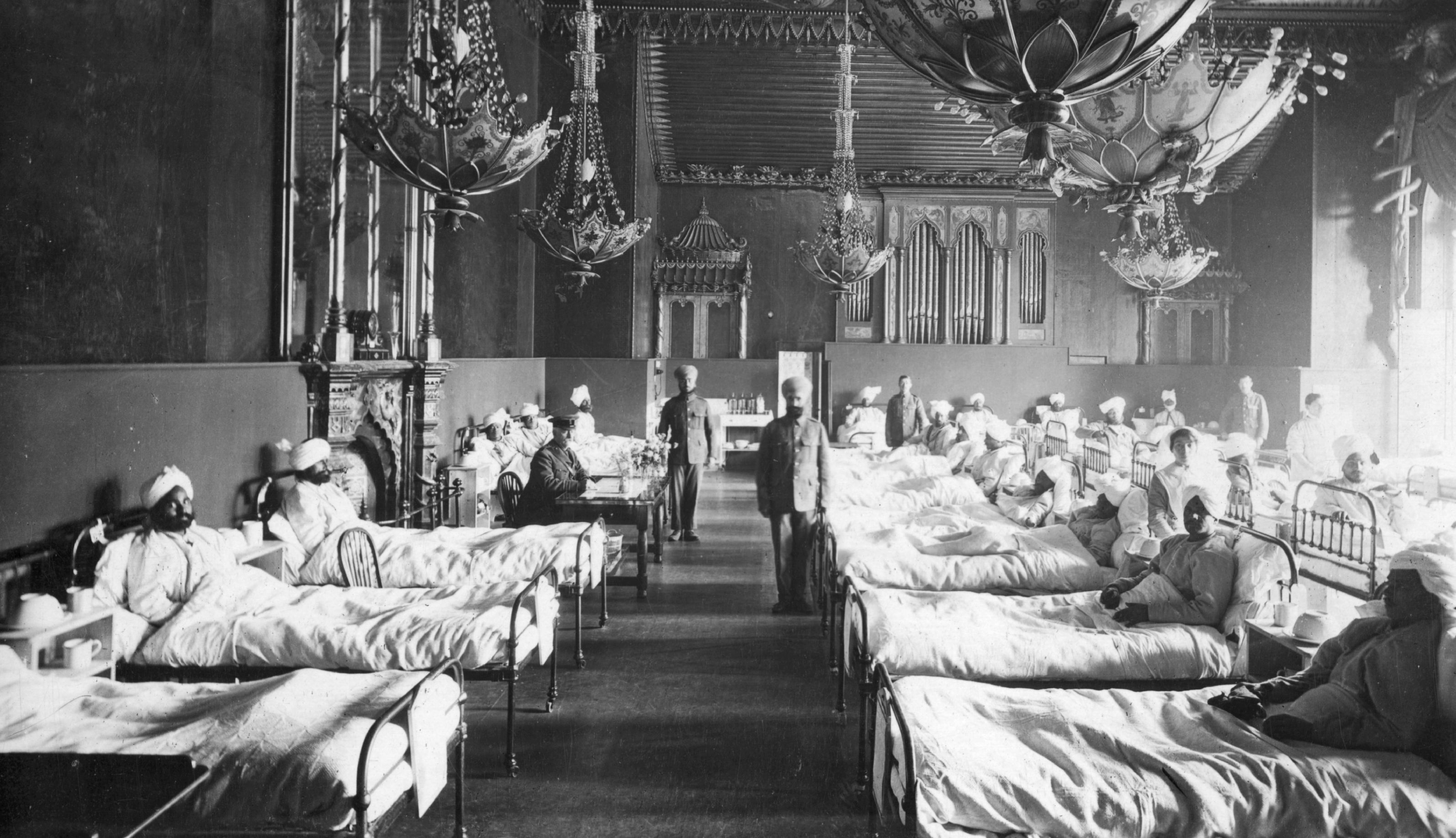
Ten stately homes which became hospitals during the First World War
To mark 100 years since the end of the First World War, The Royal British Legion draws our attention back
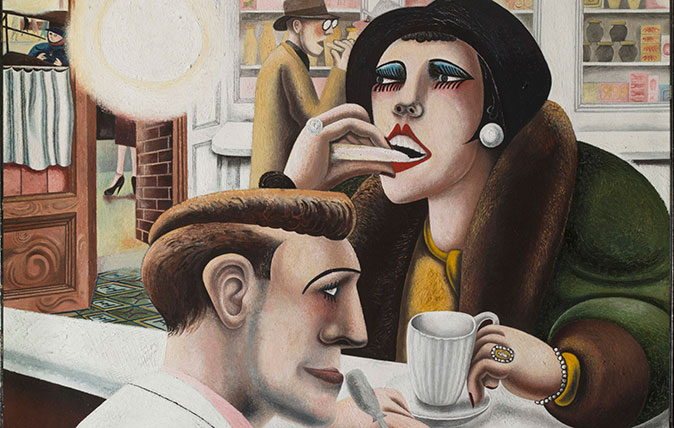
In Focus: The evocative, sensual masterpiece created in the wake of the First World War
Edward Burra was too young to have fought in the First World War, but his powerful oil painting The Snack
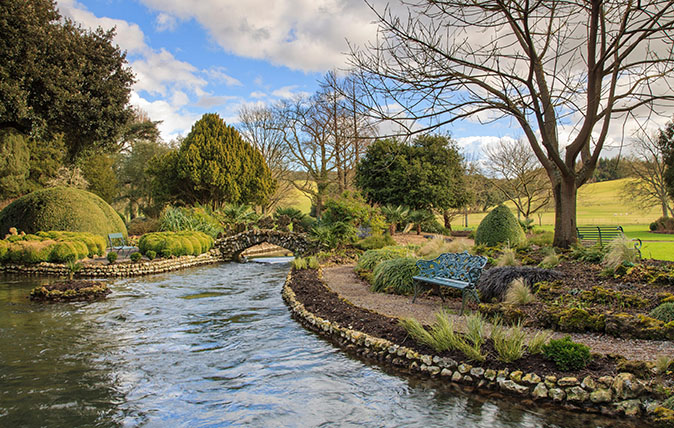
Jason Goodwin: 'The legal and democratic system that flourishes across a third of the world was hammered together on these shores'
Jason Goodwin reflects on the present's increasing ability to reflect on the past, whether through radio programs, photograph albums or
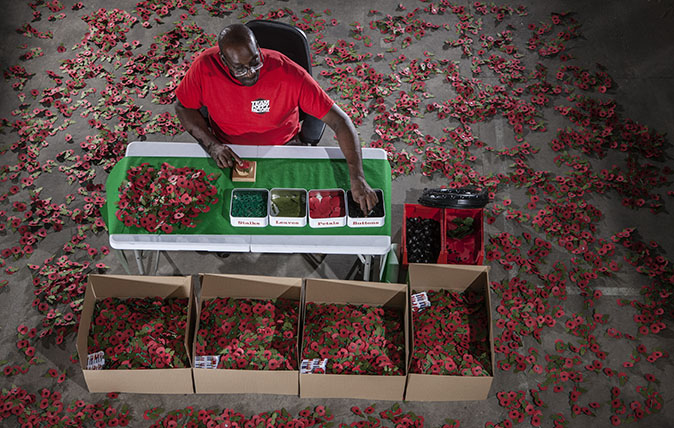
The poppy maker: ‘I was very weak, very emotional and in a bad place when I started, but I’m back to my old self again now’
Wish Lloyd battled a traumatic childhood, the army, an athletics injury and homelessness to find his place at the Poppy
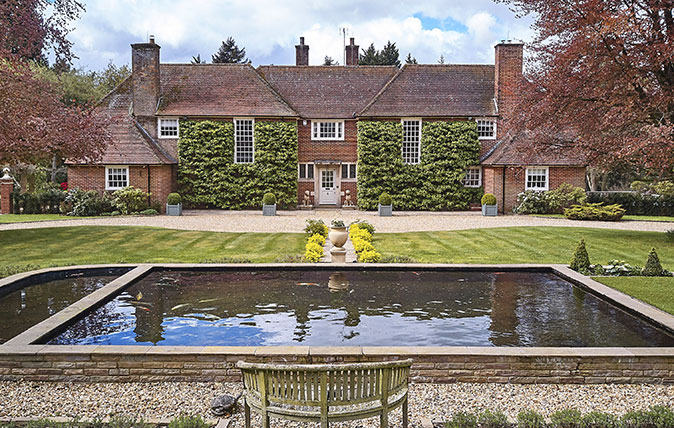
Credit: Jackson-Stops
The beautiful equestrian home of the famous Dutch philanthropist who championed Danish refugees during World War II
The Dower House has been returned to it’s original state as an elegant family home, perfectly designed for all manner

Credit: Getty
Sporting life: How to make Test cricket great again
Fans and pundits alike have long discussed the Death of Test Cricket, but longest format still has plenty to give
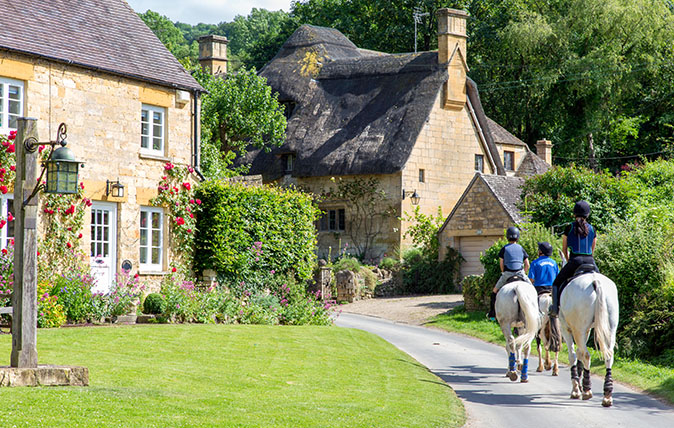
Sporting life: The best spots in the Cotswolds to enjoy country pursuits
From sailing to shooting, Holly Kirkwood explains why the Cotswolds is such a Mecca for country sporting enthusiasts.

Credit: Kevin Murray
Sporting life: 18 golf courses in the UK that every golfer should play before they die
Roderick Easdale nominates his pick of the best golf courses in Britain and Ireland, with some help from the great
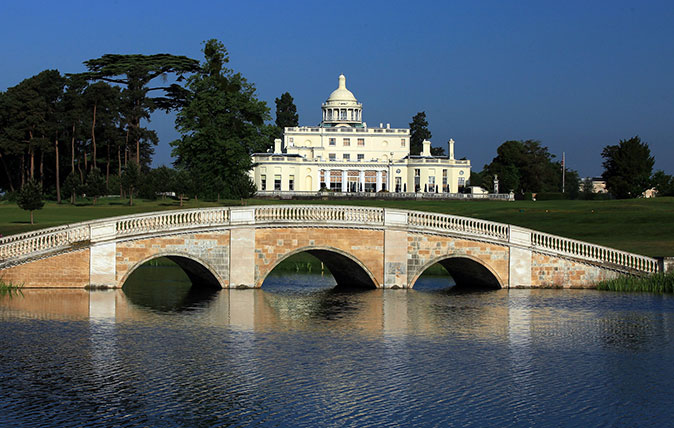
Credit: Supplied by Azalea PR - Photo by David Cannon/Getty Images
Sporting Life: Stoke Park, the golf club with the famous clubhouse, now has an equally famous coach
Stoke Park is without doubt one of Britain's most striking golf clubs. Now they've brought in one of the world's

Credit: Mackenzie & Ebert
Sporting life: Effingham golf club's restoration has turned the clock back 90 years – and it's all the better for it
When Effingham Golf Club decided they needed to bring the course up to date, they didn't look forward – instead, they

Credit: Sportsfile via Getty Images
Sporting Life: Marcus Armytage previews the National Hunt season
For many racegoers, the changing of the clocks signals the start of the National Hunt season proper. Marcus Armytage reveals

Credit: G-Tech
Sporting life: At last, a bike for the middle-aged man emphatically NOT in Lycra
If you believe that an afternoon cycling should be about enjoyment rather than charging up hills and setting personal bests,
-
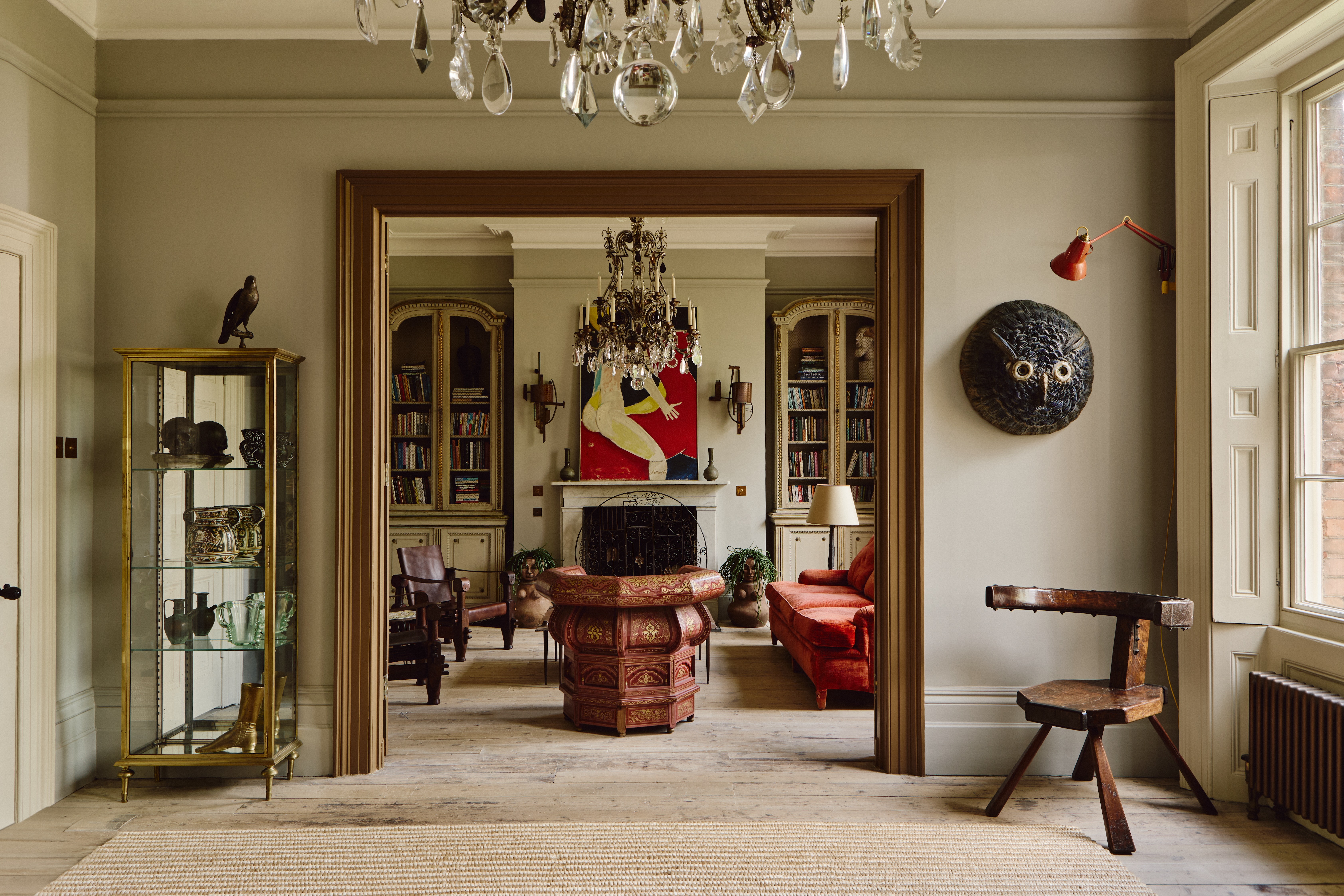 ‘It had the air of an ex-rental, and that’s putting it politely’: How an antique dealer transformed a run-down Georgian house in Chatham Dockyards
‘It had the air of an ex-rental, and that’s putting it politely’: How an antique dealer transformed a run-down Georgian house in Chatham DockyardsAn antique dealer with an eye for colour has rescued an 18th-century house from years of neglect with the help of the team at Mylands.
By Arabella Youens
-
 You're having a giraffe: Country Life Quiz of the Day, April 25, 2025
You're having a giraffe: Country Life Quiz of the Day, April 25, 2025Friday's Quiz of the Day brings your opera, marathons and a Spanish landmark.
By Toby Keel
-
 Curious Questions: Why do golf balls have dimples? And why are tennis balls furry?
Curious Questions: Why do golf balls have dimples? And why are tennis balls furry?As the weather picks up, millions of us start thinking about dusting off our golf clubs and tennis rackets. And as he did so, Martin Fone got thinking: why aren't the balls we use for tennis and golf perfectly smooth?
By Martin Fone
-
 How Country Life launched the career of Alistair Mackenzie, the architect who created Augusta National's iconic golf course
How Country Life launched the career of Alistair Mackenzie, the architect who created Augusta National's iconic golf courseAlister Mackenzie winning golf hole design.
By Roderick Easdale
-
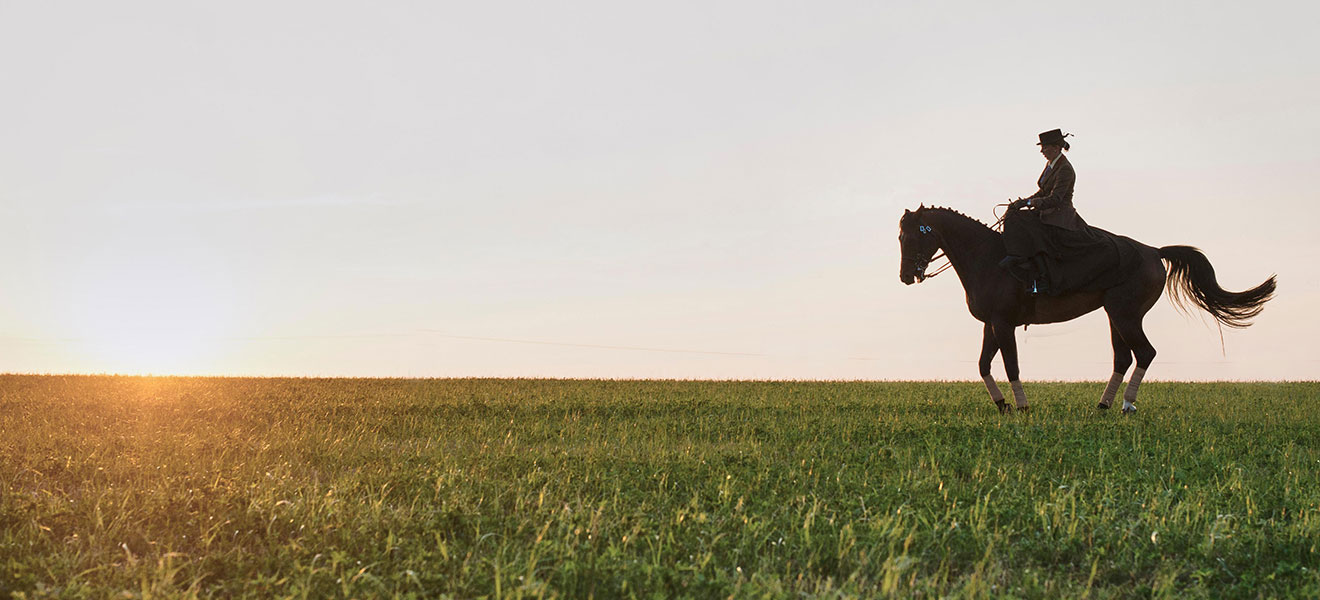 Dressage: How 'horse dancing' evolved from ancient, deadly beginnings to modern Olympic glory
Dressage: How 'horse dancing' evolved from ancient, deadly beginnings to modern Olympic gloryThere can be no short cuts to success in dressage. The Ancient Greeks’ sympathetic methods of training horses, which were all about survival in battle, should still hold good in today’s widespread embrace of the Olympic sport, as Pippa Cuckson explains.
By Concours of Elegance
-
 Inspired by Wimbledon? Expert tennis tips to help brush up a rusty game
Inspired by Wimbledon? Expert tennis tips to help brush up a rusty gameWith Wimbledon in full swing, it's the time of year when often-deserted tennis courts are suddenly teeming with players.
By Toby Keel
-
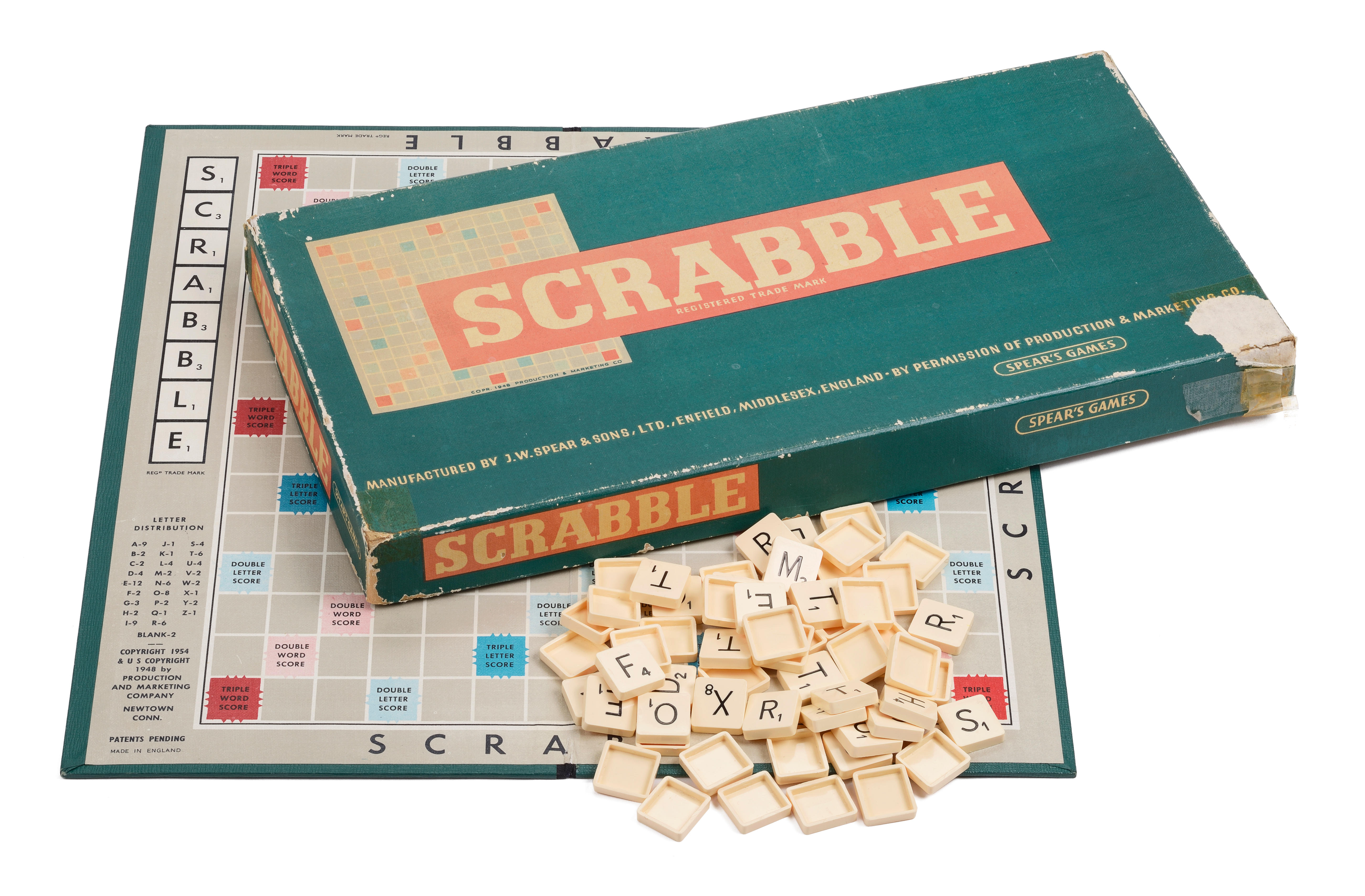 How to win at board games, from Monopoly and Cluedo to Scrabble and Snakes and Ladders
How to win at board games, from Monopoly and Cluedo to Scrabble and Snakes and LaddersAs millions of people around the country are set to have an enforced period at home, it'll be time to bring out the classic board games. But how can you make sure you beat the kids? Luck helps, but tactics are better as Matthew Dennison explains.
By Country Life
-
 Six Nations 2020: England's chance to bounce back in style from World Cup disappointment — but they're very far from unstoppable
Six Nations 2020: England's chance to bounce back in style from World Cup disappointment — but they're very far from unstoppableEngland look set to absolve their World Cup disappointment by lifting the Six Nations crown, says Owain Jones, as he gives his team-by-team guide ahead of the contest that kicks off on Saturday.
By Toby Keel
-
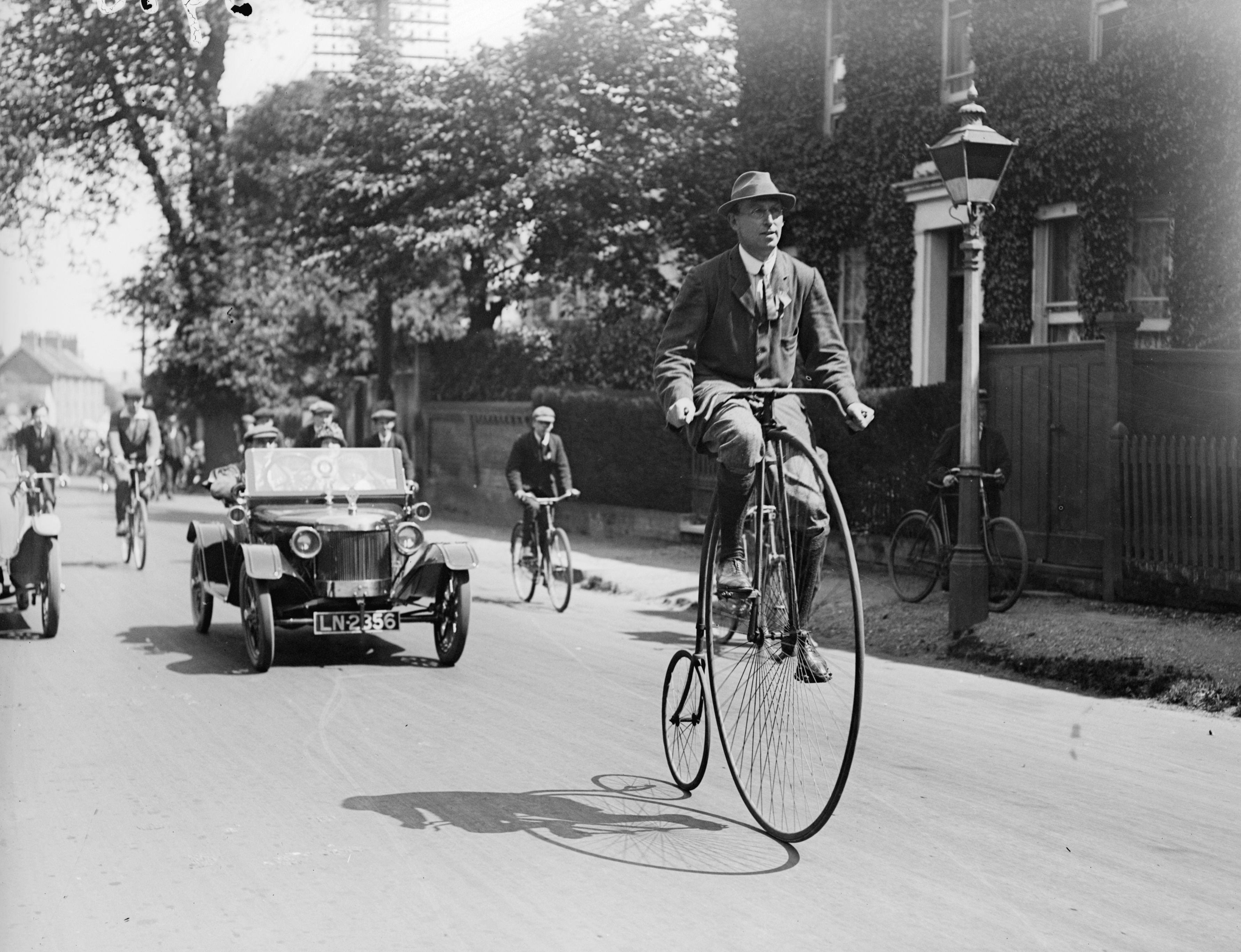 Why the Penny Farthing is once more a frequent sight on the streets of London
Why the Penny Farthing is once more a frequent sight on the streets of LondonThe dinosaur of the bicycle world is back in the spotlight with the help of the Penny Farthing Club and its intrepid members.
By Country Life
-
 Walking St Cuthbert's Way in late summer: Heather in late-summer emperor’s purple, lit up by the last burst of warmth
Walking St Cuthbert's Way in late summer: Heather in late-summer emperor’s purple, lit up by the last burst of warmthThe Cheviots and St Cuthbert’s Way are the right setting for reflection and remembrance, as Fiona Reynolds finds on her latest walk.
By Fiona Reynolds